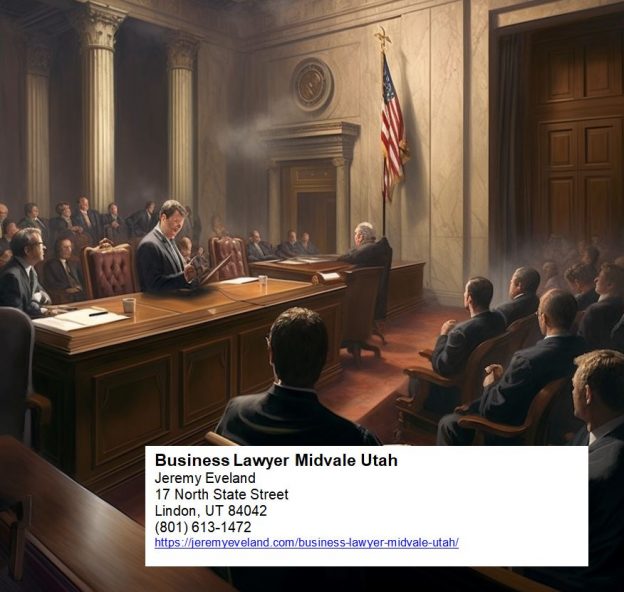“Secure Your Business with Professional Legal Advice from Business Lawyer Midvale Utah”
Introduction
Welcome to Business Lawyer Midvale Utah! We are a full-service law firm dedicated to providing comprehensive legal services to businesses in Midvale and the surrounding areas. Our experienced attorneys have a deep understanding of the legal issues that businesses face and are committed to providing the highest quality legal advice and representation. We specialize in a wide range of business law matters, including contract drafting and review, business formation and dissolution, intellectual property protection, employment law, and more. Our team of experienced attorneys is here to help you navigate the complexities of business law and ensure that your business is protected.
What is Business Law?
Business law is a broad area of law that covers many different aspects of running a business. It includes laws related to contracts, employment, intellectual property, taxation, and more. Business law is designed to protect the interests of businesses and their owners, as well as the interests of consumers. It also helps to ensure that businesses comply with all applicable laws and regulations. Business law is an important part of any business, as it helps to ensure that the business is operating legally and ethically.
Do Midvale Utah Businesses need a lawyer?
Yes, businesses in Midvale, Utah may need a lawyer for a variety of reasons. A lawyer can provide legal advice and representation in a variety of areas, including contract law, business formation, intellectual property, employment law, and more. A lawyer can also help businesses navigate the complexities of local, state, and federal laws and regulations. Additionally, a lawyer can provide guidance on how to protect a business’s assets and interests. Having a lawyer on retainer can help businesses avoid costly legal disputes and ensure that their operations are in compliance with the law.
Protecting Your Business with a Business Lawyer in Midvale Utah
As a business owner, it is important to protect your business from potential legal issues. A business lawyer in Midvale, Utah can help you do just that. A business lawyer can provide you with the legal advice and representation you need to ensure that your business is compliant with all applicable laws and regulations.
A business lawyer can help you draft contracts, review contracts, and negotiate deals. They can also help you with any disputes that may arise between you and your customers or other businesses. They can also provide advice on how to protect your intellectual property, such as trademarks and copyrights.
A business lawyer can also help you with any legal issues that may arise from the sale or purchase of a business. They can help you with the paperwork and negotiations involved in the transaction. They can also help you with any disputes that may arise from the sale or purchase of a business.
A business lawyer can also help you with any legal issues that may arise from the formation of a new business. They can help you with the paperwork and negotiations involved in the formation of a new business. They can also help you with any disputes that may arise from the formation of a new business.
A business lawyer can also help you with any legal issues that may arise from the dissolution of a business. They can help you with the paperwork and negotiations involved in the dissolution of a business. They can also help you with any disputes that may arise from the dissolution of a business.
A business lawyer in Midvale, Utah can provide you with the legal advice and representation you need to ensure that your business is compliant with all applicable laws and regulations. They can help you protect your business from potential legal issues and help you resolve any disputes that may arise. With the help of a business lawyer, you can ensure that your business is protected and that you are able to operate your business in a legal and compliant manner.
Navigating Business Litigation in Midvale Utah
Business litigation in Midvale, Utah can be a complex and challenging process. It is important to understand the legal landscape and the various steps involved in navigating business litigation in Midvale. This article will provide an overview of the process and provide tips for successfully navigating business litigation in Midvale.
The first step in navigating business litigation in Midvale is to understand the applicable laws. Utah has a variety of laws that govern business litigation, including the Utah Uniform Commercial Code, the Utah Business Corporation Act, and the Utah Consumer Sales Practices Act. It is important to understand the specific laws that apply to your case and how they may affect the outcome of the litigation.
The next step is to determine the appropriate venue for the litigation. In Midvale, the courts are divided into two categories: the District Court and the Circuit Court. The District Court is the court of general jurisdiction and handles most civil cases. The Circuit Court is the court of limited jurisdiction and handles cases involving more complex legal issues. Depending on the nature of the dispute, it may be necessary to file a lawsuit in either the District Court or the Circuit Court.
Once the appropriate venue has been determined, the next step is to prepare the necessary documents. This includes filing a complaint, a summons, and a motion for a temporary restraining order. It is important to ensure that all documents are properly drafted and filed in a timely manner.
The next step is to serve the other party with the complaint and summons. This is typically done by a process server or a sheriff’s deputy. Once the other party has been served, they must respond to the complaint within a certain period of time. If they fail to respond, a default judgment may be entered against them.
The next step is to prepare for trial. This includes gathering evidence, interviewing witnesses, and preparing legal arguments. It is important to be prepared for trial and to understand the applicable laws and procedures.
Finally, the trial itself must be conducted. This includes presenting evidence, making legal arguments, and presenting closing arguments. It is important to be prepared for trial and to understand the applicable laws and procedures.
Navigating business litigation in Midvale can be a complex and challenging process. It is important to understand the applicable laws and procedures and to be prepared for trial. By following these steps, you can successfully navigate business litigation in Midvale and achieve a favorable outcome.
The Importance of Business Law Compliance in Midvale Utah
Business law compliance is essential for any business operating in Midvale, Utah. The laws and regulations that govern businesses in the state are designed to protect the rights of consumers, employees, and other stakeholders. By adhering to these laws, businesses can ensure that they are operating in a safe and ethical manner.
Businesses in Midvale must comply with a variety of laws, including those related to taxation, labor, and environmental protection. Tax laws require businesses to pay taxes on their income and other transactions. Labor laws protect the rights of employees, such as minimum wage, overtime pay, and other benefits. Environmental protection laws ensure that businesses are not polluting the environment or otherwise causing harm to the environment.
Businesses must also comply with consumer protection laws. These laws protect consumers from unfair or deceptive practices, such as false advertising or bait-and-switch tactics. Businesses must also comply with laws related to contracts, such as those related to the formation of contracts and the enforcement of contracts.
Businesses must also comply with laws related to intellectual property, such as copyrights, trademarks, and patents. These laws protect businesses from having their ideas or products stolen or copied by competitors.
Businesses must also comply with laws related to business formation and operation. These laws govern the formation of corporations, partnerships, and other business entities. They also govern the operation of businesses, such as the filing of annual reports and the payment of taxes.

Finally, businesses must comply with laws related to the protection of confidential information. These laws protect businesses from having their confidential information, such as customer lists or trade secrets, stolen or misused.
By adhering to all applicable laws and regulations, businesses in Midvale can ensure that they are operating in a safe and ethical manner. This will help to protect the rights of consumers, employees, and other stakeholders, as well as the business itself.
The Role of a Business Lawyer in Midvale Utah
A business lawyer in Midvale Utah plays an important role in helping businesses in the area to succeed. Business lawyers provide legal advice and assistance to businesses of all sizes, from small startups to large corporations. They help businesses to understand and comply with the laws and regulations that govern their operations, and to protect their interests in business transactions.
Business lawyers in Midvale Utah provide a wide range of services to their clients. They can help businesses to draft contracts, review and negotiate agreements, and provide advice on corporate governance and compliance issues. They can also help businesses to resolve disputes, protect intellectual property, and handle litigation. Business lawyers can also provide advice on tax matters, employment law, and other legal issues that may arise.
Business lawyers in Midvale Utah also provide guidance on business formation and structure. They can help businesses to choose the right type of entity, such as a corporation, limited liability company, or partnership. They can also help businesses to draft and file the necessary documents to form the business. Business lawyers can also provide advice on how to structure the business to maximize tax benefits and minimize liability.
Business lawyers in Midvale Utah can also help businesses to protect their interests in business transactions. They can review and negotiate contracts, review and draft leases, and provide advice on mergers and acquisitions. They can also help businesses to protect their intellectual property, such as trademarks, copyrights, and patents.
Business lawyers in Midvale Utah can also provide advice on compliance with state and federal laws. They can help businesses to understand and comply with the laws that govern their operations, such as labor laws, environmental regulations, and consumer protection laws. They can also provide advice on how to handle disputes, such as contract disputes, employment disputes, and other legal matters.
Business lawyers in Midvale Utah can also provide advice on how to protect the interests of shareholders and other stakeholders. They can help businesses to draft and file the necessary documents to form a corporation or limited liability company, and to draft and file the necessary documents to protect the interests of shareholders. They can also provide advice on how to structure the business to maximize tax benefits and minimize liability.
Business lawyers in Midvale Utah can also provide advice on how to handle litigation. They can help businesses to prepare for and defend against lawsuits, and to negotiate settlements. They can also provide advice on how to handle bankruptcy proceedings.
Business lawyers in Midvale Utah can also provide advice on how to protect the interests of creditors. They can help businesses to draft and file the necessary documents to protect the interests of creditors, such as secured creditors and unsecured creditors. They can also provide advice on how to structure the business to maximize tax benefits and minimize liability.
Business lawyers in Midvale Utah can also provide advice on how to handle disputes with customers, suppliers, and other third parties. They can help businesses to draft and file the necessary documents to protect their interests in disputes, and to negotiate settlements. They can also provide advice on how to handle bankruptcy proceedings.
Business lawyers in Midvale Utah can also provide advice on how to protect the interests of employees. They can help businesses to draft and file the necessary documents to protect the interests of employees, such as non-compete agreements, severance agreements, and other employment contracts. They can also provide advice on how to structure the business to maximize tax benefits and minimize liability.
Business lawyers in Midvale Utah can also provide advice on how to protect the interests of investors. They can help businesses to draft and file the necessary documents to protect the interests of investors, such as shareholders agreements and other investment documents. They can also provide advice on how to structure the business to maximize tax benefits and minimize liability.
Understanding Business Contracts in Midvale Utah
Business contracts are an important part of any business transaction in Midvale, Utah. A contract is a legally binding agreement between two or more parties that outlines the terms and conditions of a particular transaction. Contracts are used to protect the interests of all parties involved and to ensure that all parties understand their rights and obligations.
When entering into a business contract in Midvale, Utah, it is important to understand the legal implications of the agreement. All parties should be aware of the terms and conditions of the contract, as well as any potential risks or liabilities associated with the agreement. It is also important to ensure that all parties understand the language of the contract and that all parties are in agreement with the terms and conditions.
When drafting a business contract in Midvale, Utah, it is important to use clear and concise language that is easy to understand. All parties should be aware of the terms and conditions of the contract, as well as any potential risks or liabilities associated with the agreement. It is also important to ensure that all parties understand the language of the contract and that all parties are in agreement with the terms and conditions.
It is also important to ensure that all parties are aware of the applicable laws and regulations in Midvale, Utah. All parties should be aware of the applicable laws and regulations that may affect the contract, such as those related to taxation, labor, and environmental protection.
Finally, it is important to ensure that all parties are aware of the consequences of breaching the contract. All parties should be aware of the potential legal and financial consequences of breaching the contract, as well as any potential remedies available to them if the contract is breached.
By understanding the legal implications of business contracts in Midvale, Utah, all parties can ensure that their interests are protected and that the terms and conditions of the contract are understood and agreed upon.
Common Business Law Issues in Midvale Utah
Midvale, Utah is a city located in Salt Lake County and is home to a variety of businesses. As with any business, there are certain legal issues that must be addressed in order to ensure compliance with state and federal laws. The following are some of the most common business law issues that businesses in Midvale, Utah may encounter.
1. Business Formation: Businesses in Midvale, Utah must be properly formed in order to operate legally. This includes filing the necessary paperwork with the state and obtaining the necessary licenses and permits.
2. Employment Law: Employers in Midvale, Utah must comply with state and federal employment laws, including those related to wages, hours, and benefits.
3. Tax Law: Businesses in Midvale, Utah must comply with state and federal tax laws, including those related to income, sales, and payroll taxes.
4. Contract Law: Businesses in Midvale, Utah must ensure that all contracts are legally binding and enforceable. This includes contracts with customers, vendors, and employees.
5. Intellectual Property Law: Businesses in Midvale, Utah must ensure that their intellectual property is properly protected. This includes trademarks, copyrights, and patents.
6. Consumer Protection Law: Businesses in Midvale, Utah must comply with state and federal consumer protection laws, including those related to advertising, pricing, and product safety.
7. Environmental Law: Businesses in Midvale, Utah must comply with state and federal environmental laws, including those related to air and water pollution.
By understanding and complying with the applicable business laws, businesses in Midvale, Utah can ensure that they are operating legally and protecting their interests.
How to Choose the Right Business Lawyer in Midvale Utah
When it comes to choosing the right business lawyer in Midvale, Utah, it is important to take the time to find the right fit for your business. A business lawyer can provide invaluable advice and guidance on a variety of legal matters, from contract negotiations to dispute resolution. Here are some tips to help you find the right business lawyer in Midvale, Utah:
1. Research: Take the time to research the different business lawyers in Midvale, Utah. Look for reviews and testimonials from past clients to get an idea of the lawyer’s experience and expertise.
2. Experience: Make sure the lawyer you choose has experience in the specific area of law that you need help with. For example, if you are looking for help with contract negotiations, make sure the lawyer has experience in this area.
3. Communication: Make sure the lawyer you choose is someone you can communicate with easily. You should be able to explain your legal needs and have the lawyer explain the legal process in a way that you can understand.
4. Fees: Ask about the lawyer’s fees and payment options. Make sure you understand the payment structure and that it is within your budget.
5. References: Ask for references from past clients. This will give you an idea of the lawyer’s experience and how satisfied past clients were with their services.
By taking the time to research and find the right business lawyer in Midvale, Utah, you can ensure that you get the legal advice and guidance you need to protect your business.
The Benefits of Hiring a Business Lawyer in Midvale Utah
Hiring a business lawyer in Midvale Utah can be a great asset to any business. A business lawyer can provide invaluable advice and guidance on a variety of legal matters, from contract negotiations to dispute resolution. With the right lawyer, businesses can protect their interests and ensure that their operations are conducted in accordance with the law. Here are some of the benefits of hiring a business lawyer in Midvale Utah.
1. Expertise: A business lawyer in Midvale Utah has the expertise to provide sound legal advice on a variety of business matters. From contract negotiations to dispute resolution, a business lawyer can provide invaluable guidance and advice.
2. Experience: A business lawyer in Midvale Utah has the experience to handle a variety of legal matters. From contract negotiations to dispute resolution, a business lawyer can provide invaluable guidance and advice.
3. Cost Savings: Hiring a business lawyer in Midvale Utah can save businesses money in the long run. By having a lawyer on retainer, businesses can avoid costly litigation and other legal fees.
4. Protection: A business lawyer in Midvale Utah can help protect businesses from potential legal issues. By having a lawyer on retainer, businesses can ensure that their operations are conducted in accordance with the law.
5. Peace of Mind: Hiring a business lawyer in Midvale Utah can provide businesses with peace of mind. Knowing that their legal matters are being handled by an experienced professional can help businesses focus on their core operations.
Hiring a business lawyer in Midvale Utah can be a great asset to any business. With the right lawyer, businesses can protect their interests and ensure that their operations are conducted in accordance with the law. A business lawyer can provide invaluable advice and guidance on a variety of legal matters, from contract negotiations to dispute resolution. By having a lawyer on retainer, businesses can save money in the long run and have peace of mind knowing that their legal matters are being handled by an experienced professional.
The field of business law is complex and ever-evolving, making it crucial for businesses in Midvale, Utah, to have a knowledgeable and experienced legal professional on their side. A business lawyer can provide valuable guidance, support, and protection to businesses of all sizes and types, helping them to achieve their goals and objectives while avoiding legal challenges and disputes. Whether you are starting a new business, growing an existing one, or facing legal issues, having a trusted business lawyer in Midvale, Utah, can make a significant difference.
Purpose of the Outline
This outline is intended to provide an overview of the services and benefits of hiring a business lawyer in Midvale, Utah. It will help you understand the different aspects of business law, the qualifications and expertise of a business lawyer, and the process of finding and retaining the right legal professional for your needs. Whether you are a small business owner, a startup founder, or a corporate executive, this outline will provide you with valuable information and insights that can help you make informed decisions about your legal needs.
Overview of Business Law in Midvale, Utah
Business law encompasses a wide range of legal issues that businesses face, from formation and incorporation, to contract negotiation and drafting, to intellectual property protection, to labor and employment law, and much more. It is a constantly changing area of law, with new regulations and laws being enacted regularly. Businesses operating in Midvale, Utah, are subject to both state and federal laws, which can be complex and difficult to navigate without the help of a knowledgeable legal professional.
Importance of Hiring a Business Lawyer in Midvale, Utah
Having a business lawyer in Midvale, Utah, can be beneficial in many ways. A business lawyer can help you navigate the complex world of business law, providing you with guidance and advice on the legal aspects of your business. They can also help you avoid potential legal challenges and disputes, protecting your business interests and assets. Additionally, a business lawyer can help you save time and money by handling legal tasks efficiently and effectively, allowing you to focus on running and growing your business.
Moreover, a business lawyer can help you achieve your business goals and objectives by providing you with the legal tools and support you need to succeed. Whether you are looking to incorporate your business, negotiate a contract, protect your intellectual property, or resolve a dispute, a business lawyer in Midvale, Utah, can help you achieve your goals in a timely and cost-effective manner.
In conclusion, hiring a business lawyer in Midvale, Utah, is an investment in your business’s future success. A business lawyer can provide valuable legal support and guidance, helping you to avoid legal challenges and disputes, achieve your business goals and objectives, and protect your interests and assets. Whether you are starting a new business, growing an existing one, or facing legal issues, a business lawyer in Midvale, Utah, can make a significant difference in your success.
Role and Responsibilities of a Business Lawyer in Midvale, Utah
The role and responsibilities of a business lawyer in Midvale, Utah can vary depending on the size and type of business they are representing. However, generally speaking, business lawyers in Midvale, Utah play a crucial role in providing legal advice and representation on a wide range of legal issues that businesses may face. Some of the key responsibilities of a business lawyer in Midvale, Utah include the:
Legal Advice and Guidance: Business lawyers in Midvale, Utah provide legal advice and guidance to their clients on a wide range of legal issues, including contracts, employment law, intellectual property, and liability, among others. They help businesses understand the laws and regulations that govern their operations and advise them on the best course of action to take.
Contract Drafting and Review: Business lawyers in Midvale, Utah are responsible for reviewing and drafting contracts for their clients. This includes employment contracts, supplier contracts, and customer contracts, among others. They ensure that these contracts are legally binding and protect the interests of their clients.
Representation in Legal Disputes: Business lawyers in Midvale, Utah represent their clients in legal disputes, including contract disputes, employment disputes, and intellectual property disputes, among others. They provide their clients with the legal representation they need to achieve a favorable outcome in these disputes.
Legal Compliance and Regulatory Issues: Business lawyers in Midvale, Utah help their clients comply with the various laws and regulations that govern their operations. This includes advising on tax laws, employment laws, and environmental laws, among others. They help their clients avoid legal disputes and penalties by ensuring that they comply with the law.
Mergers, Acquisitions, and Partnerships: Business lawyers in Midvale, runs, Utah play a critical role in advising businesses on mergers, acquisitions, and partnerships. They help their clients navigate the complex legal issues associated with these transactions, including due diligence, negotiation, and drafting of legal agreements, among others.
In summary, the role and responsibilities of a business lawyer in Midvale, Utah are diverse and encompass a wide range of legal issues. They play a crucial role in advising businesses on the law and providing representation in legal disputes, helping their clients achieve success and growth.
Qualifications and Skills of a Business Lawyer in Midvale, Utah
To be a successful business lawyer in Midvale, Utah, one must possess a specific set of qualifications and skills. Some of the key qualifications and skills of a business lawyer in Kearns, Utah include:
Legal Education: Business lawyers in Midvale, , Utah must have a Juris Doctor (J.D.) degree from an accredited law school and be licensed to practice law in the state of Utah. This requires completing a rigorous legal education that covers a wide range of legal topics and subjects.
Business Acumen: Business lawyers in Midvale, Utah must have a strong understanding of business and commerce, including finance, economics, and accounting. They must have the ability to understand complex business issues and advise their clients on the best course of action to take.
Excellent Communication Skills: Business lawyers in Midvale, Utah must have excellent written and verbal communication skills. They must be able to communicate complex legal concepts and ideas to their clients clearly and concisely, and e able to negotiate effectively on their client’s behalf.
Attention to Detail: Business lawyers in Midvale, Utah must have a keen eye for detail and be able to review and analyze complex legal documents. They must be able to identify potential legal issues and take steps to address them before they become major problems.
Problem-Solving Skills: Business lawyers in Midvale, Utah must have excellent problem-solving skills and be able to find creative solutions to complex legal problems. They must be able to think critically and analytically and find innovative ways to resolve disputes and achieve their client’s goals.
Ethical Conduct: Business lawyers in Midvale, Utah must adhere to the highest ethical standards and be committed to providing their clients with honest and fair representation. They must be able to act with integrity and maintain their clients’ confidential information.
In conclusion, to be a successful business lawyer in Midvale, Utah, one must possess a strong combination of legal education, business acumen, excellent communication skills, attention to detail, problem-solving skills, and ethical conduct. These qualities and skills are critical for providing effective legal representation to businesses and achieving positive outcomes for their clients.
Types of Businesses That Can Benefit from a Business Lawyer in Midvale,
A variety of businesses in Midvale, Utah can benefit from the services of a business lawyer. Some of the types of businesses that can benefit from the services of a business lawyer in Midvale, Utah include:
Small Businesses: Small businesses in Midvale, Utah often face a range of legal issues, including contract disputes, employment disputes, and liability issues, among others. A business lawyer can help small businesses navigate these legal issues and provide advice on the best course of action to take.
Startups: Startups in Midvale, Utah face unique legal challenges, including intellectual property protection, venture capital financing, and employment law issues, among others. A business lawyer can help startups understand the legal issues they face and provide guidance on how to address these issues.
E-Commerce Businesses: E-commerce businesses in Midvale, Utah face a range of legal issues, including data privacy, intellectual property, and consumer protection, among others. A business lawyer can help e-commerce businesses understand these legal issues and provide guidance on how to address them.
Real Estate Businesses: Real estate businesses in Midvale, Utah face a range of legal issues, including contracts, zoning laws, and property disputes, among others. A business lawyer can help real estate businesses understand these legal issues and provide guidance on how to address them.
Manufacturing and Distribution Businesses: Manufacturing and distribution businesses in Midvale, Utah face a range of legal issues, including contracts, liability, and intellectual property, among others. A business lawyer can help these businesses understand these legal issues and provide guidance on how to address them.
In conclusion, businesses of all sizes and types in Midvale, Utah can benefit from the services of a business lawyer. Business lawyers in Midvale, Utah can provide legal advice and representation on a wide range of legal issues, helping businesses navigate the complex legal landscape and achieve success and growth.
How to Hire a Business Lawyer in Midvale, Utah
Here are some steps you can follow to hire a business lawyer in Midvale, Utah:
Identify Your Legal Needs: The first step in hiring a business lawyer in Midvale, Utah is to determine your legal needs. Consider the types of legal issues your business is facing, and identify the areas where you need legal assistance.
Research and Gather Referrals: Once you have identified your legal needs, research and gather referrals to find qualified business lawyers in Midvale, Utah. You can ask for referrals from other businesses, use online directories or websites, or consult with the Utah State Bar Association.
Schedule Consultations: Schedule consultations with a few business lawyers in Midvale, Utah. During the consultation, ask questions about their experience, qualifications, and fees, and assess their ability to meet your legal needs.
Check Credentials and References: Before hiring a business lawyer in Midvale, Utah, check their credentials and references. Ensure that they are licensed to practice law in the state of Utah and that they have a good reputation and track record of success in representing businesses.
Review the Contract: Once you have selected a business lawyer in Midvale, Utah, review the contract or engagement letter carefully. Ensure that the terms of the agreement are clear and that you understand the services the lawyer will provide and their fees.
In conclusion, hiring a business lawyer in Midvale, Utah requires careful research and due diligence. By following these steps, you can find a qualified and experienced business lawyer who can provide effective legal representation and support your business’s success.
Conclusion
In conclusion, the services of a business lawyer are essential for businesses of all sizes and types in Midvale, Utah. Business lawyers in Midvale, Utah can provide legal advice and representation on a wide range of legal issues, helping businesses navigate the complex legal landscape and achieve success and growth. Hiring a business lawyer in Midvale, Utah requires careful research and due diligence, but by following the steps outlined, you can find a qualified and experienced business lawyer who can meet your legal needs and support your business’s success. Whether you are a small business owner, a startup, an e-commerce business, a real estate business, or a manufacturing or distribution business, a business lawyer in Midvale, Utah can provide valuable legal support and help you achieve your goals.
Areas We Serve
We serve individuals and businesses in the following locations:
Salt Lake City Utah
West Valley City Utah
Provo Utah
West Jordan Utah
Orem Utah
Sandy Utah
Ogden Utah
St. George Utah
Layton Utah
South Jordan Utah
Lehi Utah
Millcreek Utah
Taylorsville Utah
Logan Utah
Murray Utah
Draper Utah
Bountiful Utah
Riverton Utah
Herriman Utah
Spanish Fork Utah
Roy Utah
Pleasant Grove Utah
Kearns Utah
Tooele Utah
Cottonwood Heights Utah
Midvale Utah
Springville Utah
Eagle Mountain Utah
Cedar City Utah
Kaysville Utah
Clearfield Utah
Holladay Utah
American Fork Utah
Syracuse Utah
Saratoga Springs Utah
Magna Utah
Washington Utah
South Salt Lake Utah
Farmington Utah
Clinton Utah
North Salt Lake Utah
Payson Utah
North Ogden Utah
Brigham City Utah
Highland Utah
Centerville Utah
Hurricane Utah
South Ogden Utah
Heber Utah
West Haven Utah
Bluffdale Utah
Santaquin Utah
Smithfield Utah
Woods Cross Utah
Grantsville Utah
Lindon Utah
North Logan Utah
West Point Utah
Vernal Utah
Alpine Utah
Cedar Hills Utah
Pleasant View Utah
Mapleton Utah
Stansbury Par Utah
Washington Terrace Utah
Riverdale Utah
Hooper Utah
Tremonton Utah
Ivins Utah
Park City Utah
Price Utah
Hyrum Utah
Summit Park Utah
Salem Utah
Richfield Utah
Santa Clara Utah
Providence Utah
South Weber Utah
Vineyard Utah
Ephraim Utah
Roosevelt Utah
Farr West Utah
Plain City Utah
Nibley Utah
Enoch Utah
Harrisville Utah
Snyderville Utah
Fruit Heights Utah
Nephi Utah
White City Utah
West Bountiful Utah
Sunset Utah
Moab Utah
Midway Utah
Perry Utah
Kanab Utah
Hyde Park Utah
Silver Summit Utah
La Verkin Utah
Morgan Utah
Business Lawyer Midvale Utah Consultation
When you need help from a Business Lawyer near Midvale Utah, call Jeremy D. Eveland, MBA, JD (801) 613-1472 for a consultation.
Jeremy Eveland
17 North State Street
Lindon UT 84042
(801) 613-1472
Home
Related Posts
Business Lawyer Layton Utah
Impact of Environmental Regulations on Business Law Compliance
Business Lawyer South Jordan Utah
Business Lawyer Lehi Utah
Business Lawyer Millcreek Utah
Business Lawyer Taylorsville Utah
How Artificial Intelligence is Shaping the Future of Business Law
Estate Planning is Crucial for People of All Income Levels
Business Lawyer Murray Utah
Business Lawyer Draper Utah
Navigating Legal Challenges in Business Succession Planning
Business Lawyer Bountiful Utah
Business Lawyer Riverton Utah
How To Structure A Merger Or Acquisition In Utah
How To Hire Employees Legally in Utah
Business Lawyer Herriman Utah
10 Tips for Negotiating Lease Agreements
Business Lawyer Spanish Fork Utah
How To Start A Non-Profit In Utah
Business Lawyer Roy Utah
What are the Trademark Laws in Utah
Business Lawyer Pleasant Grove Utah
Utah Wholesale Business Law
Business Lawyer Kearns Utah
How to Form an LLC in Utah
Business Lawyer Tooele Utah
How to Calculate Overtime Pay in Utah
Business Lawyer Cottonwood Heights Utah
Understanding Utah’s Consumer Protection Laws
Business Lawyer Midvale Utah
[geocentric_weather id=”e42aed5e-40c9-4c75-8f33-91184cd340e2″]
[geocentric_about id=”e42aed5e-40c9-4c75-8f33-91184cd340e2″]
[geocentric_neighborhoods id=”e42aed5e-40c9-4c75-8f33-91184cd340e2″]
[geocentric_thingstodo id=”e42aed5e-40c9-4c75-8f33-91184cd340e2″]
[geocentric_busstops id=”e42aed5e-40c9-4c75-8f33-91184cd340e2″]
[geocentric_mapembed id=”e42aed5e-40c9-4c75-8f33-91184cd340e2″]
[geocentric_drivingdirections id=”e42aed5e-40c9-4c75-8f33-91184cd340e2″]
[geocentric_reviews id=”e42aed5e-40c9-4c75-8f33-91184cd340e2″]























